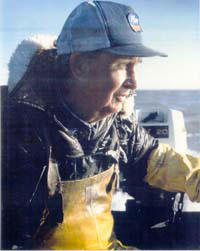
Isfeld Family
of Winnipeg Beach
Gestur & Bertha
Isfeld

Gestur Isfeld on the Lake

Lost in the Fog
In late October Gestur hadn’t returned to shore when his son Robert got out of school at 4:00 PM. All the other boats were in. There was a heavy fog on the lake and surrounding land. You could see less than 100 meters in any direction. Robert was worried. He found the keys hidden under the floor mat in the truck and drove as close to the water as possible where he honked the horn several loud blasts. He repeated this for 4 hours while moving the vehicle to several points along the shore. Meanwhile Gestur had shut don his motor and was rowing the boat. At times he didn’t know which way to go since he was completely blinded by the fog. When he heard the faint sound of a horn honking he turned the boat in that direction. After rowing for awhile he waited till he heard the horn again. Often the honking appeared to come from behind him. Finally at about 8:30 p.m. he saw the harbour and everyone was happy that he was safe.
The Winter Season
The winter fishing season brought new challenges to the fishermen. A jigger was crafted out of an 8 ft. 2 X 10 plank with a system of levers and springs to travel under the ice and take a running line from one hole to the length of one net (about 100 yards). The nets were “tied down” to keep the floats from freezing in the ice. A sharp ice chisel or needle bar was used to cut round holes approximately 24 inches in diameter. It was cold on the hands to remove wet fish from the nets before they froze stiff. The Icelandic woolen mitts were rubbed in the snow to keep them dry. Transportation started with homemade sleighs, horse and caboose or personal vehicles and some fishermen had bombadiers and later snowmobiles. You had to watch out for the ice cracks and open water that always appeared even in the coldest weather.
Happy Times
Gestur loved his job as a fisherman! He felt like a free spirit in control of his life. He could hear the sea gulls overhead flapping their wings and occasionally squawking with delight at the sight of fish. He could feel the cool fresh breeze on his face and flared nostrils wide open as he deeply breathed in the clean air. There was excitement when the nets were lifted out of the water and shiny green pickerel were waiting to be taken.
Some days the money was good. In the early 1960s when a top wage earner made $75 dollars per week, a fisherman often made $200 a day. If Bertha managed their money carefully they would have enough to live on between seasons. In the days before unemployment insurance, fishermen often had to visit the loan sharks in Winnipeg to make it through the winter. When Lake Winnipeg was closed for four years to commercial fishing due to mercury contamination, Gestur worked as a carpenter and supervisor for government works projects to clean up the lake front. Due to ill health Gestur retired from fishing in 1984 after 56 years of fishing. In his mind he still wanted to go fishing and became very depressed when he was forced to retire.
Hobbies
Gestur studied classical violin under his uncle Olafur Thorsteinson and later from Palmi Palmasson. He also became proficient with dance music and won first place in fiddle contest at Petersfield and Clandeboye. Bertha continues to knit and sew quilts.